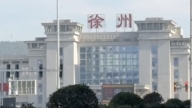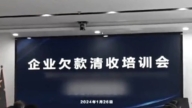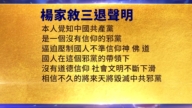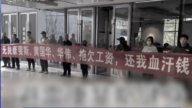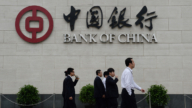【新唐人2011年11月29日讯】北京市政府为实现2011年居民收入增长7%的既定目标,授意辖区内国有企业提前发放年终奖,亏损企业也不例外。这种做法被公众讥讽为“掩耳盗铃”、自欺欺人。有评论指出,当局担心民众对低收入不满、害怕年底出现大的社会问题,因此强制提前发放年终奖。
大陆《经济观察报》消息,北京一国有企业高层人士透露,北京市政府要求所有市属国有企业和区县国有企业,都要提前发放2011年的年终奖,并要求在11月底完成。因为时间紧迫,各企业每星期都要将进展报告给国资委。
这一消息也得到了其他媒体和企业的证实。而根据《第一财经日报》的报导,北京市政府还规定:即使是在今年业绩已经出现亏损的企业,同样要提前发放年终奖,奖金额度按照上一年度的平均工资进行计算。
那么,到底是什么原因使北京市政府下达这样的命令,直接干预企业年终奖的发放呢?
原来,早在今年年初,北京市政府就宣布,计划2011年北京市城镇居民人均可支配收入,扣除物价上涨因素后实际增长要达到7%。但实际完成情况并不理想,经初步核算后目前只有5.6%。于是北京市政府想出一招,要求国企把正常应该是在明年(2012年)年初发放的年终奖提前发放,来充当今年的居民收入,“能拉多少算多少。”
台湾中华经济研究院研究员吴惠林教授:“人民的钱也不是从政府那里来的,譬如说,你去做工作,那就是厂商给你的(钱),那厂商为什么要提前发放?为什么要发放多少比例,增加多少呢?那个不是政府所能够管控的。”
吴惠林教授分析指出,当局这样做,很可能是担心民众对政府的不满。
吴惠林教授:“这个可能表示,现在中国人民一些不满,个人所得偏低,然后在过年啊,可能造成一些问题。所以中共政府就用这个强制的手段,让人民这个不满暂时缓一缓。”
《华西都市报》谈到,本来明年发的年终奖,都提前到今年了,而国企年终奖又极为诱人,这一下子平均到全民头上,人均收入当然被“拉高”。但让人不解的是,官员为何要如此掩耳盗铃?如果铁了心要注水,要面子又有何用?直接宣布目标完成就行了,反正公众也不可能掌握相关数据,即使有质疑,辟个“谣”不就行了? !
《青年时报》发表“五岳散人”的文章指出,“这是一条即将被辟谣的消息”,因为如果不辟谣,就等于是告知大众,当局在主动造假数据。虽然大家全知道造假这回事,但毕竟这么明显的真凭实据还不多。
北京市的相关国有企业也被这一规定深深困扰,某地产公司的财务人员谈到,年终奖都是与全年的绩效考核挂钩的,而现在才11月,绩效考核还没出来,怎么核算年终奖?她表示,政府对年终奖的税收有优惠,但国税局规定,一年之内,这种优惠只能有一次。而今年年初已经发放过一次年终奖,如果这次的年终奖和工资一起纳税,职工需要多缴好多钱。
实际上,被要求力保7%这个人均收入增长指标的还不只是国有企业。这个月初,北京市政府为此专门召开了一个“增收入、降价格”的专题会,会上,民政局、发改委、商委、国资委、财政局等各部门都被分配了具体任务。
新唐人记者陈汉、李谦、萧宇采访报导。
Beijing SOEs Required to Release Year-End Bonus in Nov.
In order to achieve the fixed goal of a 7% growth in income,
the Beijing authorities of the Chinese Communist Party (CCP)
ordered local SOEs to pay in advance the year-end bonus,
even with no exception of SOEs being in the red.
The action was satirized by the public as self deception.
Comments say that the CCP authorities are worried civilians’
discontent with low income would trigger an outbreak of
big social unrest at the end of the year, so forcing
the SOEs to release year-end bonus’s ahead of
the usual time.
The Economic Observer reported that an executive of a
state-owned enterprise(SOE) in Beijing, revealed that
the Beijing authorities required all SOEs in local cities,
districts and counties to release in advance
the year-end bonus of 2011,
no later than late this November.
Due to the deadlines imposed the SOEs have to hand in their
progress reports every week to State-Owned Assets Supervision and Administration Commission (SASAC).
The news was confirmed by other media outlets and
enterprises. According to the First Financial Daily reports,
the Beijing authorities also state that,
even those loss-making SOEs have no exception.
The amount of bonus equals to last year’s average wage.
What is the reasoning behind the Beijing authorities,
issuing such an order intervening directly in the SOEs’ year-end bonus releasing?
Early this year, the Beijing authorities announced that
Beijing urban residents’ disposable income was expected to reach 7%, adjusted for inflation.
However, the actual accomplishment is not ideal.
The initial estimates showed that the growth of income only achieved 5.6%.
So the Beijing authorities thought of a way, requiring SOEs to
release in advance the year-end bonus which will have to be paid at the beginning of 2012.
Thus, the year-end bonus is counted as this year’s income,
saying, “to cover as much as we could."
Prof. Wu Hui-lin (Research fellow, Chung-Hua Institution
for Economic Research, Taiwan ) says:
“Civilians’ money didn’t come from the government.
For example, you’re working for a manufacturer that gives
you payment, but why does it pay you in advance?
And how much money does the enterprise want to release?
That should’ve been uncontrolled by the government. “
Prof. Wu analyzed that the reason behind this, is the CCP
authorities’ are worried about public discontent with it.
Prof. Wu Hui-lin: “This is probably an indication of the extent
to Chinese people’s discontent, such as quite low personal income.
As the New Year approaches, it might provoke some
potential social unrests.
So the CCP authorities use such a forcible means to defer
the discontent for the time being. “
An article in Huaxi Metropolis Daily said that
the amount of year-end bonus is quite appealing plus the advanced release,
that will certainly lift this year’s per capita income.
But the puzzle is why the authorities plug their ears
while stealing a bell in such a way?
As having determined to fabricate, they may directly
announce that the target has been successfully achieved.
Anyway, the public could not obtain the relevant data,
and even if they have doubts,
the authorities could refute the rumor Leaving the question,
why didn’t they?!
An article published in the Youth Times by Wuyue Sanren,
points out that “This is a rumor to be refuted.”
Because if the news is not denied, that would tell the public
that the authorities are actively making fraud data.
Although everyone knows the fraud, there are not so many
obvious and solid evidences to confirm them.
Beijing-based SOEs are deeply troubled by this official order.
A financial officer at a real estate company says that,
the year-end bonus’s are calculated on the basis of the year-round performance appraisal.
But now the appraisal result cannot come out in November,
how do we calculate the amount of year-end bonus?
The financial officer reveals that there are preferential taxes
treatments on the year-end bonus.
But the Internal Revenue Service sets that such a
preferential tax treatment is only given once a year.
Early this year, a year-end bonus (2010) was released,
so if the year-end bonus (2011) is paid right now,
together with this month’s salary, the employees will have to
pay much more taxes.
In fact, SOEs are not the only category that are ranked
in the list of securing a 7% growth in per capita income.
Early this month, the Beijing authorities held a specific
meeting of “increasing revenue, lowering prices".
Beijing Municipal Bureau of Civil Affairs, Beijing municipal
Development and Reform Commission,
Beijing Municipal Business Committee, Beijing SASAC,
Finance Bureau of Beijing and other official departments, have all been assigned specific tasks.
NTD reporters Chen Han, Li Qian and Xiao Yu


